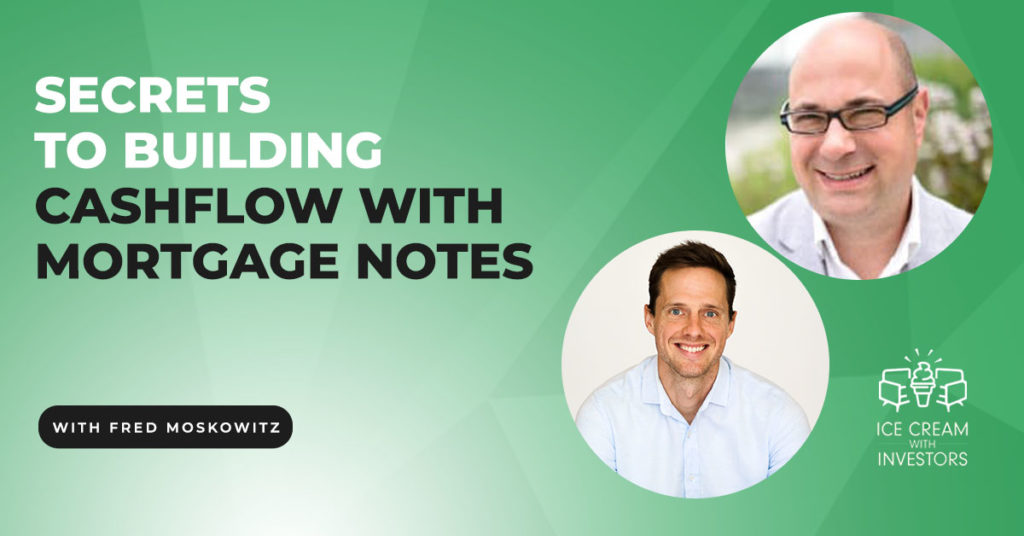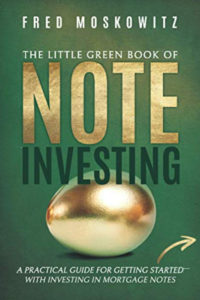Real estate has since taken different spaces and if you are looking for one with a predictable cash flow and endless possibilities to scale, take Notes! Like literally. In this episode, we learn more about building cashflow with mortgage notes. Bestselling author and educator Fred Moskowitz brings us a full pint of insights on everything you need to know within the note investing arena and tips on what to consider before you put your signature down. Tune in and learn how you can step into the shoes of the lender, take payments instead of making them every month, and “be the bank.”
—
Watch the episode here
Listen to the podcast here
Secrets To Building Cashflow With Mortgage Notes With Fred Moskowitz
In this episode, we have Fred Moskowitz. He is an educator, best-selling author, and has trained countless individuals on how to create passive streams of income on their own. As a fund manager, Fred manages a mortgage note investment fund and is considered an industry veteran in the note investing area. Fred teaches the concept of investor’s ability to step into the shoes of the lender through note investing and effectively become the bank.
Fred is also the author of The Little Green Book of Note Investing and takes pride in being a trusted and valued resource in the area of alternative investments. I am super stoked to have this man on the show because I have done a lot of deep diving into notes and Fred is one of the names that continue to come up in this space. I am going to stop right there and say, Fred, welcome to the show.
Thank you, Matt. It is a pleasure to be here.
We like to start with the difficult questions here. What is your favorite ice cream?
How has that been difficult? It is coconut. Hands down.
I love this answer because I feel like coconut is a very divisive flavor. People either love coconut or they hate coconut. You followed the correct side of that equation, which makes me really happy.

Mortgage Notes: It’s all about building relationships. One person at a time, whether it’s an investor or someone else in the note industry that we do business with. That is the key to success in this field.
It is not easy to find it. If someone goes through the trouble to make it, it is usually done very well. That is what I found.
If you have the option to get shaved coconut on ice cream, would you do it?
Yes. I would even put shaved coconut on top of coconut ice cream.
Tell our readers, what’s the scoop?
I will share a little bit about me. I am passionate about note investing. I manage an investment fund. I raise capital, and I love being an educator. I speak often and teach about note investing and investing in alternative investments of all types. I love being an author. I have fallen into some different projects. That is what I do. I love the idea of investing in assets that generate income for you while you own them. We can get a little bit more into my background story. That is something that has always been at the forefront of what I do. Whether it is in notes, real estate, or other asset classes, it is always that approach that has worked well for me.
Where did your real estate journey begin?
Start acquiring assets. The younger you are when you get started, the better off you’re going to be in the long run.CLICK TO TWEET
I started out with a very long and successful career working as a computer engineer. I loved that work. I loved it so much. I spent a lot of time working at technology startup companies during the dot-com boom. It was a fantastic time. It is so exciting. What happened was I watched my industry get turned upside down when the bursting of the dot-com bubble happened. We had the 9/11 terrorist attacks and all of the economic turmoil that happened around that time. What I realized was that I was taking on this huge risk because I was dependent on my paycheck from my job as my only source of income.
I realized that was a massive risk that I was taking on. I decided that I wanted to get involved in investing so that I could have ways to generate other sources of income for me. With that, I turned right away to investing actively in real estate. I loved it. It was great. It was something I was doing on the side while I was still working as an engineer. I had a lot of success with it. Eventually, I realized that I could not scale that because you have a couple of properties under your belt and that is going well, but what happens when you get to 10, 20, 25 or 50 properties?
Eventually, you get to a point where you cannot scale or at least you cannot do it without losing your sanity in life. Around that time, through my real estate education, I started getting exposed to note investing. I was hearing about it. I was reading about it in some of the books, mostly from the perspective of owner financing. At one point, I had the opportunity to buy notes that were already set up and had a good track record. When I saw that opportunity, I jumped on it right away. I said, “Dad, this is going to be something good that I can get involved with and leverage into something big. “
That is what I did. I shifted into note investing, and I was doing well with it. What was happening was I started getting invited to speak at different investor conferences and industry events in the note industry. People were coming out to me saying, “Fred, I love what you are doing in the note space. You seem to have this figured out and dialed in. it looks like a wonderful investment, but I do not have the time for that. It looks like it is complicated. It takes a lot of time. Could I just invest some money with you? Could I give you money, you go out and buy some notes?”
For the longest time, I did not want to do that. I said, “No, there is a lot of regulation around raising capital. You cannot informally accept money from investors.” I turned that down for several years, but eventually, it kept coming up over and over again, so I decided, “Maybe I can do something with this. I will set up a note fund and do it the right way.” The SEC work and the compliance filings set all of that. It was one of the hardest things I have ever done. After about six months of working with CPAs, attorneys, and securities attorneys, we got everything and all the filings done. I had my first note fund up and running.
We were able to accept capital from investors. That has gone well. I find it so rewarding to do what I enjoy doing, having an opportunity to teach and educate others through my books and speaking, and sometimes working with our investors and having conversations where I have a chance to explain some concepts, share ideas, and take a deep dive. For me, It is all about building relationships one person at a time, whether an investor or someone else in the note industry we do business with. That is the key to success in this field.

Mortgage Notes: Be proactive about managing your assets and your money. A great way to do that is through your self-directed accounts.
I want to highlight something you said at the beginning, which is tying yourself to one source of income can be risky move. Since you are in technology and I am in technology, I will call it the single point of failure syndrome. In technology, we are always looking at where a point of failure could be and building redundancy into that. There should be no reason we do not look at our income the same way.
I was talking to an investor who I was working with at a startup, and their equity position in that startup, pre-IPO, was $5 million in 2021. Now, it has been beaten down to $500,000. Both of those are still great paydays, so I am not discounting that, but the fact that you would tie yourself and your financial future on the equity of a startup company and it looks like it is going to pan out in the end. All of a sudden, you get a gut check in 2022. It is a difficult thing to swallow.
Sometimes the opportunities come like that. We may be young and not have too many family responsibilities and be more willing to take some risks. Sometimes, great things can happen. The main message is to seek ways to have diversification and not have that single point of failure. That is so important. I love the idea of you making money from equity and startup. That is what happens to you. Take a portion of that, put it into something else, and start acquiring assets. The younger you are when you get started, the better off you are going to be in the long run.
I want to take you back and talk about notes. Note might be a new term for some of our readers out there. Can we start with what a note is?
A note refers to the promissory note. In the industry, when someone says, “I am buying a note.” What they are referring to is you are buying the debt. It is secure debt by real estate. That is going to include the note and the mortgage, which are two separate documents. The note is the promissory note, which contains the terms of repayment, the interest rate, how much each payment is, and so on. The mortgage, or if you are out in the Western part of the US, is called a Deed of Trust. That goes together with the note. It is a separate document. That is the one that gets recorded in the public record at the county courthouse, and it is an encumbrance on the property.
It creates a lien in favor of the lender, telling the world at large that there is a debt against that property. If the title is ever to be conveyed, then this lien has to be released by the lender. The note defines the terms of the loan of the debt and then the mortgage or the deed of trust secures the property with that note that creates a security instrument or the collateral for the lender. That is a little bit of the technical side of it. In reality, when you buy or invest in note, you are buying a note. The space I work in is all residential properties. Think of your Fannie-Freddie residential, 1 to 4 units. We buy notes all over the country. That lends itself well to having some type of diversity geographically in the note portfolio.
Buy good quality assets that have a good track record on them, and you’ll do fine.CLICK TO TWEET
When you buy a note, you are becoming the lender. You step into the shoes of the lender, you receive the monthly payments described in the note, and you have all the security as well. Everything gets transferred to the new owner. As an investor, you transitioned from being the one making the monthly payments each month to become the one receiving the monthly payments each month. You do not own the property, so you do not have any of the management responsibilities and liability. You are just like the lender.
You are in a secure position and receive the payments. That is the basis of note investing. A lot of people invest in different cons of real estate, but they do not look at investing in the paper and the financing side of the transaction, which most properties are purchased with financing. A lot of real estate investors do not pay any attention to it. I think it is a very interesting part of the real estate business. Most investors, when they think of a note and mortgage, they think of being the borrower and not as being the lender. This allows you to stab across the island and become the bank.
What I love is that being a lender and being involved in note investing is a great way to increase the predictability of your cashflow. It is something that you can scale into something big because it is unheard of to own many notes. Some larger lenders and larger note funds own hundreds of notes and thousands of notes. With all of the different vendors and service providers out there, it is very easy to scale a portfolio and manage it. That was one thing that was very appealing to me. It was that ability to scale.
Before we get into the scaling piece, I loved what you said around a secured payment stream and you have an asset that is collateralized by property, but you are not the technical owner of it. I never called a bank, for instance, to say, “My roof needs repaired. I need you guys out here next week.” A lender will never get that call to come to do the mundane or the tedious parts of having to fix properties. For some of our readers, this might be a new process for them or a new area of investing. What kind of notes are you buying? They might think that only Bank of America or JP Morgan writes mortgages. Where are you finding your notes, or where are you buying them from?
Where we buy them from is through relationships. Everything in the note industry is relationship based. We can buy them from other investors or other note funds. There are some larger hedge funds on Wall Street that will buy pools of loans from banks, cut them up, and then resell them. This happens all the time. There is a whole secondary market that exists where notes are bought and sold every day. Here is something for all of you out there reading. I am sure this has happened to about every single one of you. You go out and buy a property or maybe you refinance a property, and you sign your note and mortgage at closing.
Within 1, 2, or 3 months later, you get a letter in the mail saying, “To you, Mr. Borrower, please be aware that we have sold your loan to a new lender. Here is their address and contact information. Starting next month, please send your payment to them. Do not worry. The terms of your loan have not changed in any way. The payment is the same. The interest rate has not changed. Please make sure next month, you send your payments to the new lender.” This happens all the time. The borrower does not need to approve it or anything. The lender has the right to sell their loan.

Mortgage Notes: Learn strategies and techniques. You have to find the one that’s best for you and for your personal situation because what may be best for Matt may not be best for Fred. And there’s no right or wrong answer. It just requires a personal analysis.
The reason this happens is an originator, the guys that originate loans, whether a bank, a small loan company or a mortgage company, need to recapitalize. They recapitalize, turn around, and originate a new loan for someone else. They make their money through that velocity originating loans. That sets off the secondary loan market and then loans get sold multiple times over. We make buying notes and we can look at the chain of ownership and see that it has pastored 2, 3, or 10 lenders in the past. It is customary.
Notes are bought and sold through having these personal relationships. You establish relationships and meet other investors. We all buy and sell loans to each other all the time. Maybe someone needs to recapitalize because they are getting ready to buy a larger trade of notes, so they will sell off some notes. There is nothing wrong with the notes. They need to recapitalize. It happens to real estate as well, frankly, with any asset. Someone needs capital, and then they will sell notes to raise that money.
Notes are quite a liquid asset. It is very easy to sell notes if you need to raise money. If you offer a discount when you do that, it happens all the time. That is a little bit about how notes are bought and sold. If this is a business that you want to get serious about, then you have to start with meeting people, connecting in the right groups, and getting established in the industry as an investor. When you do that, then opportunities will open up for you.
You mentioned there that banks are making their money, or at least, the bigger banks are making their money off the origination fees of the note. When you go sign a note and buy a property, you see that $1,000 origination fee. That is how banks are making their money. Ultimately, they have underwritten the paper and are selling it off to a note investor. When I talk to different people about note investing, the common objection I get is, “In 2021, mortgage rates were 2.5% and inflation was 8%. Why would I invest in notes if they are 2.5%?” Can you talk us through some of the strategies you implement to get a better return on your mortgage notes?
That is all tied to the discount when you negotiate. Just like with real estate, you make money when you buy real estate. With note investing, you negotiate a discount when you buy. When you buy a note for less than the amount owed, the value of that payment stream and the rate of return increase. The note that was at 2.5%, as an example, may go up to 5% and 6%, depending on how much of a discount was extended there.
I buy notes that have been originated some time ago. The rates now are not reflected in the notes we are buying because they were from some time ago. The changing rate environment will impact the pricing of notes as we move forward. I am not out there buying notes that originated last month. I am buying notes that originated 5, 10, or more years ago. Whatever the interest rate was at the time it was originated, that’s what it is. That will not change unless you buy an adjustable rate mortgage, which has its own nuances there. The notes with a lower interest rate impact the pricing of it.
The best time to plant a tree was 20 years ago. And the second best time to plant a tree is right now.CLICK TO TWEET
I am going to plug a book here by Jim Napier called Invest in Debt. It is by far one of the best real estate books I have ever read. Not necessarily that Jim was the best author or anything like that. It just changed my mind on how I thought about buying deals. What he does in that book is he gives you a formula. If this is the interest rate, it is 3%, and you want to make 8%, at the risk of doing public math here, then you need to buy that at an 80% discount. At that 80% discount, you are building in that return. It is one of the best books by far in helping me understand the space.
That is one of the first books that I read about note investing. I had the opportunity to learn from Jim Napier at a real estate group. He was doing a weekend workshop on negotiation skills for buying real estate. He got off on this little side discussion talking about how he was involved in note investing. I thought, “That is interesting.” I bought his book right at the conference and took it home with me. That book is such a great resource. It teaches you how to use a financial calculator, which is super important in note investing, as well as real estate investing, so you understand finance.
The premise of the financial calculator is you have four variables, the number of payments, the rate of return, the present value of the debt, and the interest rate. If you have 3 of the 4 variables, you can solve for the fourth. The financial calculator allows you to do that quickly. If you want to figure out a payment amount or an interest rate amount, whatever you are missing, you have three variables and you solve for the fourth. That is a wonderful book. It was impactful. It’s something I recommend to anyone interested in getting involved in note investing to check that out.
That is one of the things I love about notes. It is just math at the end of the day. If you want to make 12% on a note and the interest rate is 2%, then this is what you need to offer to get that 12% of return. It is beautiful there. Another objection I commonly hear is there is not a ton of tax advantages to owning notes like there is in real estate. With real estate or physical property, you get some of the depreciation tax benefits, etc. With notes, you do not get that. Are there any strategies that you use to help offset that objection?
I completely agree with that objection. Note investing generates tax liability. You are going to get interest income or capital gain. If you are doing well, you are going to have to write a pretty substantial tax bill check each year. One of the best strategies that I love is pairing together note investing and doing it inside of a tax advantage account, like a self-directed Roth IRA, an HAS, or a self-directed account.
If you are, for instance, doing deals in your Roth IRA, you can invest in individual notes and own them in your IRA, or you can invest in a note fund, which is a managed pool, and have that owned in your IRA, all of that growth you do not pay taxes on. If it is a traditional IRA, you defer the taxes until you draw down the account. If it is Roth, it is tax-free growth. That is the way to go.

Mortgage Notes: Focus on the fundamentals. Don’t focus on a huge upside or appreciation. A steady and stable income is a great way to go.
When investors talk to me if they are interested in our fund and ask questions about it, one of the things I always like to bring up in the beginning is, “Are you planning on investing using a self-directed retirement account?” A lot of times, people just say, “I do not know what that is. I did not know you could do that.” I said, “Let’s stop everything we are talking about. We are going to focus on this for a little bit.” It is very important for people to be aware because so many folks out there left the old 401(k) behind at a prior employer and did not touch it when they left or they have an old IRA sitting there that they are not using well.
I say, “When you left your last employer, didn’t you clean out your desk? You took all your things home in the box, your pictures, and your personal item, but you left your 401(k) there under the control of some administrator that is collecting fees every ever year on your account. Why do you do that?” Take your 401(k) with you and move it into an account that you can control. That is something I always stress. It is important to do that. Be proactive about managing your assets and your money. A great way to do that is through your self-directed accounts.
I love that strategy. It goes really well with note investing. Some of those other assets, like owning rental real estate, are great for owning outside of a tax advantage account so that you can benefit from the depreciation and all those tax benefits. Everything you do in your investing world has a place where it is going to be best suited for that. These are conversations that you should be having with your CPAs and tax advisors, or maybe you attend some workshops by some highly skilled experts in this area and learn these strategies and techniques. There are many different ones out there. You have to find the one that is best for your personal situation. What may be best for Matt is not the same as what may be best for Fred. There is no right or wrong answer. It just requires a personal analysis.
I wrote down that if you have native tax advantages to owning an asset like a single-family home or multifamily, do not also own it in a tax-advantaged account because you cannot get double the benefit. If you have a tax advantage account, that is where you can put in assets that do not have a ton of tax advantages, such as owning an ETF, for instance. As we have seen here in 2021 and 2022, what goes up sometimes comes down even harder.
Notes are a phenomenal asset to own in a self-directed IRA because they are steady Eddy, consistent stable returns that have no tax real advantages to them. If you own them in a tax advantage account, all of a sudden, you are getting that extra tailwind because they are in a tax advantage to count there.
The tailwind can be quite significant, especially if you look over a 20 or 30-year time horizon. The impact is substantial.
Real estate is not a get-rich-quick thing. Neither are notes. It’s slow and boring. But over time you have the compounding income. And that’s what sets you up for financial momentum.CLICK TO TWEET
I was reading The Psychology of Money by Morgan Housel. That is one of the things he talks about. The true path to wealth is having stable, repeatable investments and then extending that out for the longest period amount of time. If you can have a stable, repeatable investment that you can hold basically forever, that is the path to wealth. I have been dying to ask somebody in the note space this question.
In March of 2020, I thought there was going to be a ton of distressed debt on the streets. That would be the time to go in and make some buying opportunities. As we saw with some of the foreclosure moratoriums and eviction moratoriums, we have not seen the distressed market come alive. However, going into the back end of 2022 and going into 2023, it feels like there could be a big opportunity to go find some of this distressed debt and get it reperforming. How are you looking at the debt markets as a whole in the mortgage space?
There are a couple of points I will touch upon. One thing that happened in 2020 and at the beginning of the pandemic is a large amount of notes were put out for sale. The reason was there was a liquidity crunch that happened. Some of the larger investors and funds maybe had their lines of credit all due, and they had to liquidate notes quickly. We saw large quantities of notes getting put out for sale in secondary market. It was a great opportunity to buy because sometimes it is difficult to find notes to buy, especially in this hot real estate market that we have been having. There have not been a lot of notes for sale, whether they are performing notes or nonperforming notes.
Defaults in the area of nonperforming notes are fairly low. There are not a lot of them happening. If you think about it, if someone gets behind on their payments, they get into trouble. It is pretty easy for them to turn around and sell the property quickly and get out from under the issue. The defaults are not a super high rate. Another thing that we found in our portfolio is that throughout the pandemic, there were some borrowers that had some hiccups and missed some payments here and there, but for the most part, people eventually got caught up.
Some folks got furloughed from work or had a temporary work stoppage because of the shutdown, but then after some time, they went back to work and got back on track again. That was some of the direct impacts in our portfolio. We did not have any issues that could not be worked through with some time and flexibility. Moving forward, it is going to be interesting to see what happens as the interest rates have been going up and are impacting the housing market. It is a cyclical environment for real estate with the price of assets. The same as it is in notes and debt.
It goes up and down. There are market cycles. It changes ahead. We will see how that is. There are a lot of moving parts for sure. I am not going to speculate too much about what will happen. It is the fundamentals of investing. Buy good and quality assets that have a good track record on them and you will do fine if that is what you focus on. It does not matter whether it is a rental property or note. Focus on the fundamentals. Do not focus on a huge upside and appreciation. A steady stable income is a great way to go. That would minimize the chances of you getting hurt or running into problems if there was a downturn.

Mortgage Notes: Investment in yourself and your growth in knowledge and skills. That’s something that no one can ever take away from you, no matter what.
I would rather you speculate and tell us where 2023 is going to be because we are on the internet. No one will remember if you are wrong. I agree with a lot of what you are saying. We are looking at a number of different factors here. No one thought the Fed would come in and print trillions of dollars and just buy up all this distressed debt and guarantee it. Who knows what is going to happen. As long as you are buying good quality assets that are stable and consistent, over the long run, you will be fine. Fred, I want to take us now to our last round. We are calling this the Five Toppings. Our first one is, what is your favorite book, or what is a book that you have read that has given you a paradigm shift?
It is Napoleon Hill’s Think and Grow Rich. I am involved in a collaborative book project where we are breaking down and doing an analysis of the thirteen principles that are outlined in the book, Think and Grow Rich. There are thirteen principles that Napoleon Hill outlined. In this book project, we go through each of those principles, and a whole volume is created. We are writing with about 30 to 35 co-authors. We are writing for each person’s interpretation and experiences on that chapter.
It is causing me to read each chapter again. I have all this experience behind me, and reanalyzing the chapter, internalizing it, and seeing how it has influenced me. It is a wonderful project. The project is called The 13 Steps to Riches. We are putting out every two months another volume for this. It is wonderful to learn from all of these different points of view, but for me, it is so rewarding to look within, think about what I have learned and the skills that I have developed, and share that with everyone else. It feels like giving back to the world and paying it forward from some of the great minds that I have learned over the past decades.
There is a reason why it gets nominated as one of the best financial books a lot.
That book has impacted so many people. It was written in 1937. Still to this day, the information there is so relevant and timely.
The second one is I believe that the person you become ten years from now is directly correlated to the habits that you have and the things that you do every day. What are some of the habits that you have every day?
Never be afraid to invest in yourself. If you do budgeting, set a line item in your personal budget for investing in yourself, and your education.CLICK TO TWEET
I write every day. I journal and write, whether it is writing for my newsletter, a book project I am in, or journaling or writing articles. I really enjoy that. I have so much satisfaction out of sharing my work with others. In addition to that other habits, I plan my day every day. I am careful about being strategic with my time. I do that every morning. Another thing I do is focus on my health and wellness. I go work out at the gym almost every day. I sit in the chair all day. I am on the phone and on the computer.
At the end of the day, I get up, go to the gym, and train in a wonderful environment. It gets me moving. It gets my blood flowing and you get oxygen in the brain. It gives us energy because what we need as business owners and entrepreneurs is lots of energy to do what we do, like mental energy and stamina. It is wonderful. That is an investment that everyone must make. It is investing in your health and your wellness. Eat right, have good, healthy habits, and exercise. Get moving. I do not care whether you are a marathon runner or getting up and going for a walk after lunch every day. Do whatever fits in your lifestyle, but do it consistently. That is going to change your life.
Our third one is what is the best piece of advice you have ever received?
The best time to plant a tree was twenty years ago. The second best time to plant a tree is right now.
I think about that a lot when people ask me all the time about the real estate market, like, “Is it too high? What are your thoughts on that?” I am like, “It depends on when your timeframe is. Is it high compared to twenty years ago? It might seem that way. Is it high compared to 30 years from now?” I do not know. Probably not. I love that piece of advice.
It is about having that long-term approach to what you do. Real estate is not a get-rich-quick thing, and neither are notes. It is slow and boring. Over time, you have the compounding. That is what sets you up for financial momentum.
Our fourth one is, what is the thing that you are most proud of in your life?
The thing I am most proud of in my life is having people reach out to me, whether it is in person, after they have heard me speak, or they read my work. They reach out and say, “Thank you. I learned some concepts, ideas, and techniques you talk about. I put it into practice. I am benefiting from that now. I want to thank you.” Hearing that is the most rewarding feeling because it reminds me that I made a difference in someone’s life. Many people did that for me when I was getting started. I think it is so important to turn around and teach someone else that is getting started so that they can benefit in their life.
Our last one is if you can sit down and eat a bowl of ice cream with anyone, dead or alive, who would it be and why?
I am a Philly guy. I am in Philadelphia. I always look up to one of our founding fathers, Benjamin Franklin, who also spent a lot of his life here in Philadelphia. The one thing that he taught about was that an investment in knowledge pays the best interest. One of the best things you can do is invest in yourself. Never be afraid to invest in yourself and spend money. If you do budgeting like a personal budget, set a line item in your personal budget for investing in yourself and your education. You can go do trainings, whether it is online. Travel somewhere. Attend a workshop or seminars.
There are so many great ones out there that you can learn. The investment in yourself and your growth in knowledge and skills is something that no one can ever take away from you, no matter what. You will carry that with you for your life and continue to benefit and have a return on your investment throughout your whole life. I think Benjamin Franklin was a fascinating man and mind with so much to learn from him.
Fred, a fantastic conversation. If our readers want to reach out to you and learn more about you or get in touch, where is the best place we can point them?
I love connecting with investors. The best way to do that is to visit my website, which is FredMoskowitz.com. If you would like easier spelling, you can go to GiftFromFred.com. Connect with me there, and you can sign up to receive my newsletter if you like. Also, check out my book available on Amazon, The Little Green Book of Note Investing. One more thing. If you prefer using your mobile device, you can text the keyword, MONEY, to (215) 462-4433, and then follow the prompts, and you can sign up there. I love hearing from investors. I love networking and building relationships. I invite all of you to connect with me. I look forward to having a more in-depth discussion.
Fred, thanks for coming to the show.
Thank you so much, Matt. This was a wonderful conversation. It was great speaking with you. Thank you for having me on.
Important Links
- Fred Moskowitz
- The Little Green Book of Note Investing – Amazon
- Invest in Debt
- The Psychology of Money
- Think and Grow Rich
- GiftFromFred.com
About Fred Moskowitz

Fred Moskowitz is an educator and best selling author who has trained countless investors on how to create passive income streams of their own.
As a fund manager, Fred manages a mortgage note investment fund and is considered an industry veteran within the note investing arena.
Fred teaches the concept that individual investors are able to step into the shoes of the lender, through note investing, and effectively “be the bank”.






